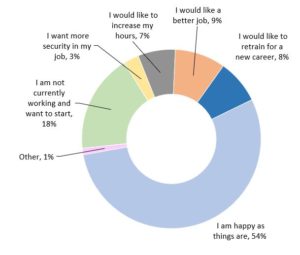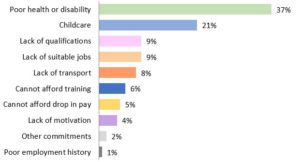Customer satisfaction surveys are important, but you don’t have to do the same old thing every time. I’ve been working with landlords who are supplementing the core questions with some really interesting enquiries – and the results are even more interesting.
For instance, what about your residents’ aspirations? In the past everyone has probably asked the question where residents see themselves living in five years’ time. They had good reasons for this: early identification of potential purchasers or householders likely to want larger or smaller homes is helpful for planning.
But that’s not all you can do with that kind of information: what about helping residents back into employment or better-paid jobs? Read on for what we discovered when we asked residents of one housing association about their employment or career aspirations.
“What are your employment/career aspirations?”
Answering this question, 54 per cent were happy as they were and 18 per cent were out of work and wanted to find a job. Nine per cent wanted a better job, with eight percent aspiring to train for a new career and seven percent wanting to increase their hours. Three per cent wanted more job security. Of those who ticked “Other”, the only additional aspiration was to do voluntary work.
Employment and career aspiration
What else do landlords need to know to help their residents?
If you want to support residents, the obvious follow-up question is to find out about the barriers preventing them from realising their aspirations. This survey showed poor health or disability was the problem for over a third of residents, with childcare issues affecting a further fifth.
Other barriers included lack of qualifications or suitable jobs (each cited by just under one in ten), and transport. Five per cent could not afford to take a pay cut to get a preferred job, while a remarkably candid four per cent blamed lack of motivation.
Barriers to residents’ aspirations
Why might you consider adding this type of question to your customer satisfaction survey?
As we’ve seen, these insights are not hard for landlords to acquire, by adding questions to a routine survey. This kind of information is useful for proactive associations who may be considering how to support a group of residents who might be able to find more secure or better-paid employment with the right help.
In turn, this type of intervention – done well – may improve resident satisfaction and have other beneficial effects including a better understanding of clients. Remember, this is only an example of the type of questions which can be asked – your association may want something entirely different.
How can Acuity help?
As always, we’d be delighted to help and offer an independent, expert assessment of your service, which is the most valuable information you can have. To find out how, please do contact us.








Comments are closed.